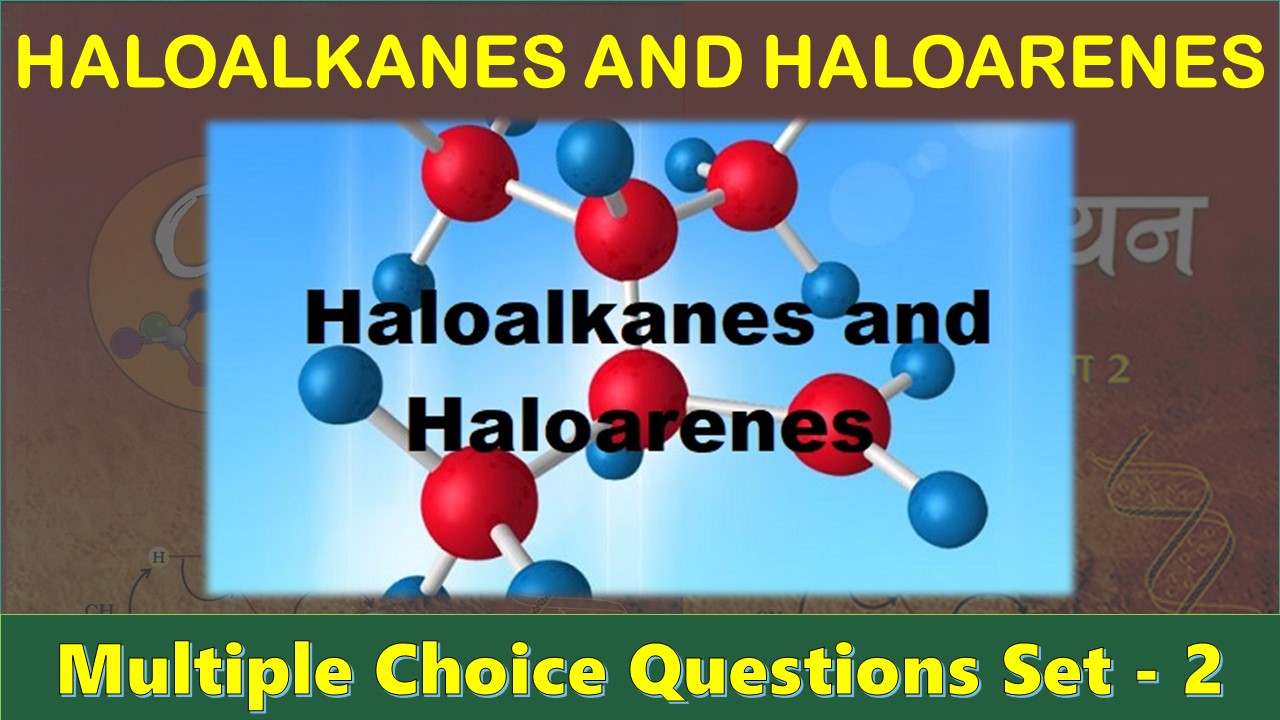CBSE Class 12 Haloalkanes and Haloarenes with Answers Multiple Choice Questions with Answers. MCQ Questions Class 12 Haloalkanes and Haloarenes with Answers with Answers Is Prepared Based on Latest Exam Pattern. Students can solve NCERT Class 12 Haloalkanes and Haloarenes with Answers MCQs with Answers to know their preparation level.
Students who are searching for NCERT MCQ Questions for Class 12 Haloalkanes and Haloarenes with Answers with Answers are compiled here to get good practice on all fundamentals. Know your preparation level on MCQ Questions for Class 12 Haloalkanes and Haloarenes with Answers with Answers. You can also verify your answers from our provided MCQ Class 12 Haloalkanes and Haloarenes with Answers with Answers. So, ace up your preparation with MCQ of Class 12 Chemistry Examinations.
MCQ Questions Class 12 Haloalkanes and Haloarenes with Answers - Set - 2
Question 1:
If there is no rotation of plane polarised light by a compound in a specific solvent, though to be chiral, it may mean that
(a) the compound is certainly meso
(b) there is no compound in the solvent
(c) the compound may be a racemic mixture
(d) the compound is certainly a chiral
Correct Answer – (A)
Question 2:
Chlorobenzene gives aniline with
(a) NH3/Cu2O
(b) NH3/H2SO4
(c) NaNH2
(d) None of these
Correct Answer – (A)
Question 3:
The reaction of toluene with Cl2 in presence of FeCl3 gives predominantly
(a) benzoyl chloride
(b) benzyl chloride
(c) o and p-chlorotoluene
(d) m-chlorotoluene
Correct Answer – (C)
Question 4:
Fluorobenzene (C6H5F) can be synthesised in the laboratory
(a) by heating phenol with HF and KF
(b) from aniline by diazotisation followed by heating the diazonium salt with HBF4
(c) by direct tluorination of benzene with F2 gas
(d) by reacting bromobenzene with NaF solution
Correct Answer – (B)
Question 5:
Among the following which one has weakest carbon-halogen bond?
(a) Benzyl bromide
(b) Bromobenzene
(c) Vinyl bromide
(d) Benzyl chloride
Correct Answer – (A)
MCQ Questions Class 12 Haloalkanes and Haloarenes With Answers
Question 6:
Chlorination of toluene in the presence of light and heat followed by treatment with aqueous NaOH gives
(a) o-cresol
(b) p-cresol
(c) mixture of o-cresol and p-Cresol
(d) benzoic acid
Correct Answer – (C)
Question 7:
Decomposition of benzene diazonium chloride by using Cu2Cl2 / HCI to form chlorobenzene is
(a) Raschig reaction
(b) Sandmeyer’s reaction
(c) Kolbe’s reaction
(d) Cannizzaro’s reaction
Correct Answer – (B)
Question 8:
Which of the following statements about benzyl chloride is incorrect?
(a) It is less reactive than alkyl halides
(b) It can be oxidised to benzaldehyde by boiling with copper nitrate solution
(c) It is a lachrymatory liquid and answers Beilstein’s test
(d) It gives a white precipitate with alcoholic silver nitrate
Correct Answer – (A)
Question 9:
The compound formed on heating chlorobenzene with chloral in the presence of concentrated sulphuric acid is
(a) gammexane
(b) DDT
(c) freon
(d) hexachloroethane
Correct Answer – (B)
Question 10:
Which of the following reactions is an example of nucleophilic substitution reaction?
(a) 2RX + 2Na R – R + 2NaX
(b) RX + H2 RH + HX
(c) RX + Mg RMgX
(d) RX + KOH ROH + KX
Correct Answer – (D)
- NCERT Solutions Class 11 Chemistry Chapter 1 : Some Basic Concepts of Chemistry
- NCERT Solutions Class 11 Chemistry Chapter 2 : Structure Of The Atom
- NCERT Solutions Class 11 Chemistry Chapter 3 : Classification of Elements and Periodicity in Properties
- NCERT Solutions Class 11 Chemistry Chapter 4 : Chemical Bonding and Molecular Structure
- NCERT Solutions Class 11 Chemistry Chapter 5 : States of Matter
- NCERT Solutions Class 11 Chemistry Chapter 6 : Thermodynamics
- NCERT Solutions Class 11 Chemistry Chapter 7 : Equilibrium
- NCERT Solutions Class 11 Chemistry Chapter 8 : Redox Reactions
- NCERT Solutions Class 11 Chemistry Chapter 9 : Hydrogen
- NCERT Solutions Class 11 Chemistry Chapter 10 : The s-Block Elements
- NCERT Solutions Class 11 Chemistry Chapter 11 : The p-Block Elements
- NCERT Solutions Class 11 Chemistry Chapter 12 : Organic Chemistry: Some Basic Principles and Techniques
- NCERT Solutions Class 11 Chemistry Chapter 13 : Hydrocarbons
- NCERT Solutions Class 11 Chemistry Chapter 14 : Environmental Chemistry




